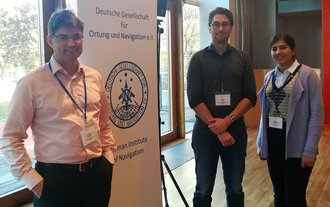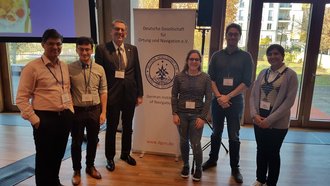Positioning and Navigation for Intelligent Transport Systems – Conference POSNAV 2018
Scientists from Bauhaus-University present contributions to highly automated driving at the interdisciplinary conference on "Positioning and Navigation for Intelligent Transport Systems" (POSNAV).
While aiming for organising traffic more efficiently, safely and environmentally friendly, academics and industry are working closely together with the public sector on fostering the digital interconnection between infrastructure and vehicles. These Intelligent Transport Systems (ITS) are in rapid developing and see increasing public awareness, especially in the field of autonomous driving. Thereby, highly precise localisation and navigation acts as a key technology and thus the interdisciplinary conference “Positioning and Navigation for Intelligent Transport Systems” (POSNAV) has been established as an important platform for scientific exchange. Researchers from the Bauhaus-Universität Weimar participated again actively with contributions regarding the fields “digital road” and “truck platooning” in the talks given on the 15. and 16. November in Berlin.
Motorways already see first pilot projects in the so-called "truck platooning“, where multiple trucks are interconnected wirelessly to improve traffic safety and reduce fuel consumption. Whether this idea also works within urban spaces is currently investigated by the two researchers M. Sc. Marco Fedior and M. Sc. Wido Hamel from the Chair of Transport System Planning. With their contribution “Evaluation Framework to Determine the Potentials of Platooning for a Reduction of Atmospheric Pollutants in Street Spaces” they presented a strategy for examining this complex question by linking microscopic traffic simulation, air pollutant emission models and dispersion models for pollutant immissions.
The interdisciplinary research group “The Digital Street” was represented on the POSNAV 2018 by M. Sc. Mahsa Mirboland (Chair of Computing in Civil Engineering) and Dipl.-Ing. Raimo Harder (Chair of Transport System Planning). Together with the Chair of Steel Construction, the group aims for developing a cost and energy efficient configuration of sensor networks for streets and bridges to support autonomous driving and optimisation of infrastructure maintenance. Their conference talks stated the “Requirements for Sensor Networks as part of the Digital Street Data Communication for Autonomous Driving and Deployment in Traffic Management Centres” (R. Harder) and their ideas as well as the progress status regarding “Semantic Modelling of Intelligent Transportation Systems” (M. Mirboland).
Prof. Dr.-Ing. Uwe Plank-Wiedenbeck, Head of the Chair of Transport System Planning and Vice Chairman of the German Institute of Navigation (DGON e.V.) – which hosted the POSNAV – emphasised the importance of this interdisciplinary conference that stimulates exchange across various disciplines and took a very positive stock thanks to the great number and broad spectrum of contributions. The environmental engineering students Anna Aue, Hannes Mechler and Maximilian Wunsch followed the kind invitation of the DGON to Berlin as well and had the chance to gain rich experience on the procedures of scientific conferences as well as to participate in interesting discussions.
The next POSNAV conference will be held together with the European Navigation Conference from the 11. to 14. May 2020 in Dresden
Author: Maximilian Wunsch


